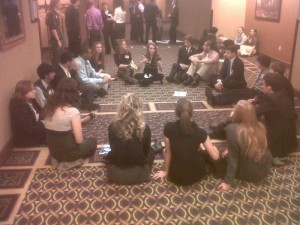Last week, the Great Lakes Invitational Model United Nations (GLIMUN) met for the 37th year, bringing together some of the region’s powerhouse high school teams. For four days in Kalamazoo, MI, 250 delegates from 11 schools compete in one of the most true to form simulations of the United Nations on the circuit.
Delegates were spread across seven committees, three in the General Assembly, two in the Economic and Social Council and a simulation of the United Nations Security Council. Debating issues as complex as protecting humanitarian workers in conflict zones and the environmental impact of the United Nations itself, the application of universal jurisdiction of crimes against humanity and the threat of potential total territorial loss by states due to climate change, delegates had their work cut out for them.
After two and a half days of debate, and several resolutions passed through the committees, GLIMUN then took on a format unseen at most conferences: Plenary Session. The General Assembly and ECOSOC plenaries united their committees together, their individual delegates into delegations, which then had to work as a team to amend and pass the resolutions, agreed upon or voted down as a unified body. The style places an emphasis on teamwork and broad knowledge of all the topics at hand unseen at other competitions, while modeling the process of the UN in ways many delegates are unaware of.
The conference itself is run by the Great Lakes Invitational Conference Association, an independent non-profit that was started by students at Eastern Michigan University over thirty years ago. Unlike college-run conferences, GLIMUN has the advantage of drawing on volunteers from regional heavyweight schools like Michigan State University, University of Michigan, and Northwestern University, while also having a more stable retinue of professionals. On staff this year were medical professionals, lawyers, biologists, and international relations professionals.
Competition was fierce this year at GLIMUN, but several schools rose above the others. In the General Assembly, Plenary awards were won by Royal Oak High School as Gabon, Forest Hills Northern as France, and the Roeper School as Brazil. In ECOSOC, Forest Hills Northern also pulled off a win as France, with the other delegation award taken by Egypt from Forest Hills Eastern. A full awards list can be found below. Delegates and advisors both left closing ceremonies excited for GLIMUN 2012. For more information, please visit http://www.glica.org.
Best Delegates
- Adam Mageed- France, DISEC
- Aaron Bernard- Brazil, SPECPOL
- Amit Khandhadia- DPRK, Legal
- Hailey Dann- Ukraine, UNEP
- Cody Colvin- Russian Fed, Sustainable Development
- Bob Wang- France, Security Council
Honorable Mentions
- Erik Burbulla- Brazil, DISEC
- Cody Hoeffel- Gabon, DISEC
- Freida Blostein- South Africa, SPECPOL
- Collin Mathias- France, SPECPOL
- John Kim- France, Sustainable Development
- Trevor Grayeb- France, Legal
- Kate Kelley- Gabon, Legal
- CJ Biggs- Russian Fed, UNEP
- Veronica Dulin- South AFrica, Security Council


